Project Blue eyes
Summary
The novel Blue eyes recounts the true story of Rita Prigmore-Winterstein, a Sinti or Gypsy woman from Würzburg (Germany).
Her family was heavily persecuted under the Nazi regime. In 1933 all Sinti were assessed. Five percent were recorded as ‘full blood gypsies’ and were spared, but the other ninety-five percent, the ‘mixed-blood gypsies’ were forcibly sterilised from 1942, and eventually most of them were deported to Auschwitz.
One of them was Theresia Winterstein. When the moment for her sterilisation arrived, she was pregnant with twins. However, she would be permitted to keep her children on condition that she submitted them to ‘Science’. Professor Werner Heyde of the University Hospital in Würzburg was responsible for over-seeing the progress of her pregnancy, together with his friend Joseph Mengele. Both doctors had a particular fascination for twins. Later, in the concentration camp of Auschwitz, Mengele experimented on hundreds of twins.
Rita and Rolanda Winterstein were born on March 3, 1943. During the course of the medical experiments of Werner Heyde – presumably to give them blue eyes – Rolanda Winterstein died on April 11, 1943. Rita survived the year long experiments and was then given back to her mother. Fortunately, because of her marriage to the ‘full blood gypsy’, Gabriel Reinhardt, Theresia and Rita Winterstein escaped deportation to the concentration camp of Auschwitz.
Meanwhile, from 1943 onwards, more than half of the Winterstein family from Würzburg was deported into the gypsy family camp in Auschwitz. Eleven members died. Only three returned back alive.
Rita Winterstein was continually sick as a result of damage caused by the experiments to which she had been subjected. She ceased going to school in the fifth year of primary school, and throughout her life she suffered far more frequently from ill-health than she enjoyed good health.
In 1953 Theresia submitted a request for compensation for her daughter. Rita was examined by a doctor. Could that person have been the same Werner Heyde? After the war Heyde continued practising, with the knowledge of many people, under the false name of Fritz Sawade. He regularly visited the University Hospital in Würzburg in secret with his wife … and she also received a pension. But in 1958, Heyde was unmasked, and he committed suicide whilst in prison. In 1959, the application from Rita was rejected.
Rita Winterstein was married in 1964 to George II Prigmore, an American soldier. Their son, George III, was born in 1965, and they had a daughter, Sherry, in 1966. Later they moved to the United States. In 1973 Rita lost consciousness for a second time, whilst driving her car, and she ended up in hospital. Only then did her mother tell her the truth about what happened to her during the war.
Meanwhile, Theresia Winterstein became President of an International Association in Germany for the defence of women's rights for the Sinti, and she demonstrated against a meeting of former Nazis in Würzburg.
Owing to difficulties in her marriage, Rita returned to Germany in 1981 and assisted her mother in her fight. A new demand for damages was submitted. Only in 1988, after a further seven years and endless examinations, Rita received compensation. That was forty-three years after the war!
The treatment of victims of the Nazis was in sharp contrast to what happened with the perpetrators. Only a small number were sentenced during the processes of Nuremberg, and of the estimated million Nazis employees, 990,000 remained in service after the war and established careers. That was also the case for practically all the judges, plus a vast majority of doctors. At least 350 of the doctors, who had carried out medical experiments on people, just continued working.
In addition, the persecution of the Sinti continued: no longer openly, but by more subtle methods. As it was prohibited to live in trailers the Winterstein family moved first to barrack accommodation, and later to an apartment. Such a restriction was instrumental in removing a fundamental aspect of their identity: mobility. To this day the Sinti continue to try and preserve their identity, but it is not easy in a society that endeavours to render everyone alike. The multicultural society is fiction, essentially because the Germans still do not accept that people have different identities.
In 2012, Rita Winterstein came into contact with the Catholic lay community of Sant'Egidio, and together with a youth pilgrimage she visited the concentration camp of Auschwitz for the first time. That visit changed her life and since then she has looked at society with different eyes and made the decision to leave Germany.
“As a confirmed Christian I have forgiven everyone for what they did to me and my family in the past," she writes in the last chapter of the book. "I have forgiven, but I can never forget what happened. Today, when I look into the eyes of people in the streets, I feel they have a deep-rooted hatred for all non-Germans. In the 1930's and 1940's the Jews and the gypsies were the victims. Today it is the Roma and Turks. The neo-Nazi party, NPD, is permitted to sow hatred. Why? The answer is clear to me. German society is still imbued with the spirit of National Socialism, and Western civilisation is just a very thin layer of veneer. From the end of the 19th century Bavaria experienced a climate of racism, and for 12 years the Nazis continued to feed such racism into the minds of all Germans. That mentality still lives on.
I am deeply faithful, but in Church I can no longer shake the hand and give a sign of peace to people who openly proclaim racial hatred. I can no longer live in a country where xenophobia is on the increase. That is why I have decided to return to my children and grandchildren in the United States.
The only thing that kept me here for so many years was caring for the graves of my deceased family members. However, for that I have now found a solution.
In my life I still have two goals. I hope to spend some happy years with my children and grandchildren. They are most precious to me and I have missed them for so many years. I would also, if my health permits, like to bear witness and to teach young people to forgive, but never to forget what happened in the past.”
The historical novel
This book contains various sections.
Section 1. Archive and literature
The content of this book is based on archive research and study of literature.
The archives of the Winterstein family contain thousands of original documents and photographs.
Section 2. Personal accounts.
All the facts in the first section are supplemented by personal accounts. I had three sessions of intensive discussions with Rita Palmer-Winterstein., each encounter lasting one week.
Section 3. Psychological reconstructions.
This book is not primarily about their history, but recounts what the Winterstein Sinti family, ordinary flesh and blood people, experienced during the course of the past century.
With a deep sense of empathy I have tried to portray all the characters as profoundly as possible, but at the same time placing major emphasis on the psychology of the two main people, Theresia and Rita Winterstein.. Similar attention is given to the other family members, and also addresses that of the persecutors, Werner Heyde and Christian Blüm.
These dialogues are an excellent instrument with which to analyse the souls of all the characters.
Section 4. Historical Mentality
This book outlines first of all the individuality, the values, the standards, the living habits and the taboos of the traditionally nomadic group of the population. However, unravelling the soul of the Sinti is not straightforward. It is very difficult for a non-Gypsy to penetrate into their lifestyle and environment. A deeper understanding is, however, crucial to appreciate this story.
The Chronicle of the Winterstein Gypsy family at the initial level is emblematic of the fate of the Gypsies in the final section. That aspect is important because of the Gypsy orphanage in the history of the Holocaust. More than ninety-five percent of all publications describe the fate of the Jewish people. However, of the 500,000 Gypsies who were exterminated, little is known.
In addition, the novel describes the mentality in the history of Germany from before, during and after the war, and also encompasses the perspectives of both the perpetrators and the victims.
Section 5. The primacy of the story
This book melds from the primacy of the story harmoniously together all those elements into a coherent whole. That follows the chronology.
Using a true story as its inspiration, this book seamlessly blends the various known elements of the story into a coherent story-line. This is achieved in each chapter by creatively reconstructing events as seen through the eyes of various characters to fill in the gaps of the story, creating a subjective retelling of the story without attempting to be factual.
This honest story testifies to the cruelty and yes, sometimes horror, which barely has an equal in human history. On the other hand, it also contains a rarely seen and deep human beauty, together with an authentic experience of the Christian faith. No one can remain indifferent to the message of forgiveness by someone who, for more than seventy years, has suffered from the consequences of the medical experiments which were carried out on her, and where half of her family, including her twin sister, have been murdered. The most important lesson is to make people aware that, what has happened in the past, can be repeated in the future.
The author
The Belgian publicist and journalist Koenraad De Wolf (born Zottegem, Belgium, October 3, 1956) studied history and art history at the KU Leuven.
Since 1982 he has published more than 35 books – in total some 6,000 pages. (see website www.koenraaddewolf.be) Blue eyes is his first historical novel.
Content
The birth of the twins
The same blood, the same eyes and the same soul
We must avoid that inferior hereditary characteristics are reproduced
Here you have no name, but you are a number
We're going to create an Aryan race
I am not going to be the whore of the boars that have the death of my children on their conscience
Why must the citizens suffer again after twelve years of nazi terror?
I’m so glad that this nightmare went by
They took away once more our real freedom
Her mind is taken off to heaven
Recaptured in a cage
War criminals get amnesty, but victims are not recognized
Teared up in two pieces
Stumbling stones
The visit to Auschwitz changed my life.
Accountability
Chapter 1 book
The birth of the twins
“This is going to be a memorable day for our University and also for you, Theresia Winterstein”, said Carl Joseph Gauss when he entered the Delivery Room with my medical records under his arm. He made some notes. Despite his advanced age, he still firmly gripped his pen.
“Today is Wednesday ...”
“March 3 ’43, Professor”, said the fat midwife.
“Hmm, only 48 kilogrammes.” He put his glasses right. “Due to your physical condition a birth at eight months is not abnormal.”
"She is almost nine inches dilated”, said the second long-haired midwife, as she checked beneath the sheet that covered Theresia’s legs.
"I estimate that your children will be born in about fifteen minutes”. She tried to comfort Theresia. "Stay strong!”
But the young woman cried out when a new contraction began.
Gauss assertively stuck out his hands. The oversized midwife put his gloves on.
Theresia felt lonely. German men assisted their wives during childbirth, but for the Gypsies the delivery room is off limits to men. Her father, Papo, and her mother, Josephine, were waiting outside in the hallway, because Gabriel, the father, was not in Würzburg. And to make matters worse, two agents of the Criminal Police, the Kripo, stood guard. They looked like two wax figures standing in a corner of the room.
"Hmm, what’s keeping Heyde?” asked Gauss. “He should have been here at 5 pm. He wanted to do the delivery of the twins himself.” Gauss looked at his watch.
“We can’t stop nature, professor. Too late”, said the plump midwife who wanted to remove the sheet.
“The agents ... of the Criminal Police ... must turn their backs ... during the birth”, demanded Theresia. “They are not allowed to see my lower body.”
Both chuckled. "Hey, the Kripo rules here, ma’am”, said the man on the right. "Christian Blüm, the Head of our Gypsy Office, has commanded that your twins will be handed over to science after birth. But I can turn a blind eye. What do you think, colleague?” he said, spluttering with laughter.
“In our culture ...” Theresia started to defend herself, but she was immediately shouted down.
“You're not in gypsy country, ma’am, but in Germany.”
"Silence!” commanded Gauss.
The contractions were coming faster. The bed sheet was removed.
"Push!", ordered both Gauss and the midwife.
When Theresia’s water had broken the previous night, the irregular contractions had left her exhausted. "I can’t go on.”
But she constantly thought of the words op Papo: ‘A real Winterstein never bows his head, he believes in God, and never gives up’. She summoned up her last bit of strength.
“The head of the first child is coming ” said the chubby midwife encouragingly. “We’re almost there. Push again!”
She then pressed with much force onto the right side of the abdomen.
Suddenly things happened very quickly. Whilst her colleague took the newborn, Gauss cut the umbilical cord. The midwife went to the adjoining room followed closely by an agent of the Kripo.
“Is it a boy or a girl?” Theresia asked, crying from both pain and happiness.
Gauss only smiled. “The first delivery went well.”
“Let me see my baby”, begged Theresia.
“Quiet now. The time will come”, soothed the midwife . “We are only halfway through. Focus on your breathing as I have taught you.”
“Everything will be fine”, said Gauss. “The second birth is imminent.”
Suddenly the door swung open. Werner Heyde came in. His sharp chin, pulled down mouth corners and piercing eyes always reminded Theresia of a wolf.
“Where have you been? The first baby has already been born.”
“I come from Joseph Mengele in Günzburg. There’s a lot of traffic. It took three hours to get to Würzburg.”
“Any news?"
"A Lot."
"A Lot?"
"Irène is pregnant."
"Twins?"
"He hopes so, of course."
"Or is it a triplet or a quad?", quipped Gauss.
"Don't exaggerate!"
"Did he tell you anything more?"
“He just came back from Berlin where he had visited von Verschuer. You know: he has succeeded Fischer as Head of the Anthropological Institute”, said Heyde hastily as he picked up a white apron and gloves. “Mengele gets a new job.”
Gauss looked surprised. “How? Doesn’t he go back to the Eastern Front?”
“He’s unfit for active service due to the wound on his foot, but unexpected opportunities are coming up, Carl”, laughed Heyde. “You know all those experiments on people in the camp of Dachau for the army and the airforce, and the endless tests on people against malaria, typhoid and dysentery in the other camps. Well they will soon fade into insignificance. Verschuer has given Mengele complete freedom of action to practice in the new camp of Auschwitz, and that is going to be the largest of the German Empire. There will be a separate camp for the Gypsies. Mengele can pick out all the twins from the transports that will pass through on a daily basis. What do you think?”
A big smile appeared on Gauss’ face.
“The great work begins, Carl. For the first time in history, researchers will have unlimited access to human research material”, beamed Heyde. “Mengele is right. The study of genetics is at a turning point. If we succeed in tracing the genetic code of the twins, we can increase their number of births. Thus, in the long term, this will not only offset the losses at the front, but also fulfil the ambition of our Führer - to rule the world. Do you realise that the creation of the master race will become a reality ?
“I have to see first if it will happen so soon."
"You? You are a pessimist! You’re almost at the end of your career, but our country needs men with ambition. And you know Joseph anyway. And he has even more arrows to his bow. Mengele is convinced that he can change the color of the eyes of his subjects.”
Incredulously, Gauss looks at Heyde.
"Who are we to contradict to Joseph? He has the full support of the Antrolopogisch Institute. We are on the verge of a revolution in medical science, Carl!
The world belongs to those who dare. Our Führer has already proven that. Mengele is convinced that he will occupy a place of honor in the firmament of medical science. There are people who have received the Nobel Prize for Medicine for a lot less.”
They were interrupted by a cry of Theresia when another contraction began.
“There are two amniotic sacs, Werner. They are not identical twins as you had predicted, but fraternal twins”, said Gauss.
Hastily a nun from the Sisters of Rita from Würzburg entered the delivery room in full regalia. “Professor, in the next delivery room another birth is imminent, Eleonore Winterstein. She is nine centimetres dilated.”
“My niece”, stammers Theresia. “Right at the same time!”
“I will take over here, Carl.” Heyde patted Gauss on the shoulder. “I am deeply happy with my first study object. I assure you that Joseph is jealous of us! His fingers are itching, because his research area in Auschwitz will only be ready next month. You know: ‘Nothing is so fascinating as twins’, said Fischer and Verschuer. They should know, because no one in Germany, or even worldwide, has such knowledge in that field. Very soon only twins will be born: with blue eyes!”
Gauss went to the adjacent delivery room, shaking his head.
Heyde put his hand on Theresia’s knee. For the first time since she had been in his care, she saw him smile. She turned her head away. She hated the man ever since she had seen him enter the headquarters of the SS in Ludwigstrasse in Wurzburg a few months ago, in his black uniform. The horrendous pictures of Crystal night of 1938 flashed through her mind. “What harm has that paramilitary organisation of the Nazis, that calls itself the Protection Department, already done!”
Five minutes later the second baby came screaming into the world, and the midwife and an agent of the Kripo disappeared into the adjoining room.
“The worst is over”, said Heyde. “The pain has gone, right? Keep breathing gently. We’re waiting for the afterbirth.”
But when the expulsion of the placenta didn’t immediately occur, Heyde said: “We're going to give nature a little help.” He asked the fat midwife to suck at the Theresia’s nipple.
“Out of the question! That cannot happen!” Theresia tried to sit up but was pushed back on the table by the midwife.
“What’s wrong with that? It's a fact of nature. It releases the placenta more speedily.”
“With us, the gypsy’s, the body of a woman ... ”
“Are you here to suggest what I should do”, shouted Heyde. “Who do you think you are? You ... ”
The conversation was interrupted because the placenta came out spontaneously. Heyde tightly wrapped a sheet around the belly of Theresia and left the Delivery Room without a word.
Josephine and Papo hugged and congratulated their daughter.
"They have taken away my babies. I beg you, Papo, go look! In the room next to the delivery room."
But the door was locked
“Congratulations”, the nun said. She apparently was responsible for the maternity ward. "They’re two girls.” She looked at her paper. “The first weighs 2.70 kilogrammes and the second 2.28 kilogrammes. They are now being fed by a foster mother because they are below the normal birth weight. However, we will now commence your milk production. May I ask visitors to leave the room?”
“When will I see my children ?”
The nun didn’t say a word.
“Just wait”, said Professor Gauss who visited Theresia in the evening.
“Professor Heyde ...” she said, but Gauss immediately interrupted her.
“Do not believe the rumors that the Professor only does his job because of his loyalty to our Führer. Heyde is one of our most competent doctors.”
“But what is happening to my children?”
“The Professor is only doing some tests," he said in a paternal tone. "Nothing special. Don't worry. Try to sleep now."
Sleep? While she didn’t not know what was happening to her children? Although tired of childbirth she couldn’t sleep. Images of recent years flashed through her mind. The posters on the street when she was still at school. The Jews are our misfortune and Avoid anything that is Jewish. The smashed windows of Jewish shops and synagogues after that terrible Crystal night in November 1938. According to the media this was a “spontaneous uprising” of the population against the Jewish enemy. Ruth, a Jewish girl from the class, came to see her in great panic.
“Something terrible is happening at home. I'm so scared.”
“We’re going to look”, said Theresia. "Arm in arm we are twice as strong.” Along the way they passed the headquarters of the Gestapo in Ludwigstrasse. There were lots of people milling around. Various groups patrolled to teach the Jews a lesson: they were loudly singing and marched in closed ranks. Their black uniforms, high boots and shiny jackets were a terrifying sight.
On entering Ottostrasse they could hear shouts and jeers in the distance. From the first floor of the building members of the Gestapo were throwing all the furniture out of Ruth’s house and onto the street. The family’s library suffered the same fate. Theresia saw her father, a doctor, cringe when beautiful hand-bound books on medicine that he had inherited from his grandfather, and of which he was so proud, received the same treatment and were thrown out like everything else. When the family photographs were burned at the stake, Ruth began to scream. Immediately members of the Gestapo grabbed her. She was made to wear a bracelet with a Star of David, and on her neck they marked: Jewish pigs, we don’t want you. When her mother, whose face was covered with soot, had her hands joined as if in prayer, she was beaten down.
Taken aback Theresia walked home along Domstrasse and Theaterstrasse which, shortly before the 49th anniversary of the Führer, was renamed Adolf Hitler Strasse. The streets were still lined with swastika flags. What were people celebrating here? She had vomited in a gutter along the way.
“They want to eliminate the Jews because of their money and influence”, Papo said when that evening at home she told him what she had experienced. “Don’t be afraid. We, the Sinti people, are not rich, and because we travel around, we are not involved in politics. Moreover, we are, like all the inhabitants of Bavaria, Catholics. What can they do to us? And when someone asks something, we play music. Everyone then brightens up immediately.”
He laughed, but Theresia heard from the tone of his voice that he didn’t mean what he said. He didn’t want the family to be worried. But Theresia knew better. Because of their traditions, the Sinti were a thorn in the side of the Criminal Police, the Kripo. Fight against the Gypsy Menace: merely the heading of the new law of Heinrich Himmler, the Minister of Interior Affairs, instils fear. As if they were vermin to be exterminated.
The course Race Hygiene at school was still in her memory. Their first task was to read the book Concise racial knowledge of the German people by the Nazi ideologist, Hans Günther. They called him the Race Priest. And as homework they had to calculate how many wedding loans of one thousand Reichsmarks can be granted when 300,000 mentally ill people don’t have to be financially supported anymore. With her class they went to the cinema O-Li in Augustinerstrasse. When she watched the film Hereditary Ill, a propaganda film that wanted to convince everyone of the need for race biological measures, she kept her eyes closed all the time.
She recalled very sharply that day when the teacher hung up a frightening placard showing the development of the ‘inferior’ and ‘superior’ people. “In one hundred years there will be ten times more inferior people on this earth”, she warned. “Germany cannot possibly let that happen, and our Führer has decided to improve the human race. The health of the nation is more important than that of individuals. Everyone knows that the Aryans are the most superior people on earth because of their special qualities. We need to protect German blood and destroy inferior races. Girls with blonde hair and blue eyes: please stand up. Yes, give them a round of applause.”
There was the sound of clapping, but Theresia just wanted to crawl into the ground with shame when she suddenly felt that the teacher was gazing at her.
“You do not applaud, Theresia?”
Theresia tried not to hear the laughter.
“Our government will do all in its power to prevent any miscegenation”, pontificated the teacher. “I hope that the Führer’s dream of an Aryan Germany becomes reality.”
“What if we merge our blood", proposed Theresia to a Sinti-girlfriend on the playground. "We have learned in the lesson of mathematics that a double negation automatically becomes positive. Isn’t that a good idea?”
The joke worked on her classmates like a red rag to a bull.
“Is it true that gypsies steal children in order to eat them ?” asked someone tauntingly.
“Are your parents beggars, swindlers and thieves?” continued someone else.
The number of bullies gathering around her multiplied. “Can your mother really read palms, or does she tell people what they want to hear in exchange for money?”
“Is it true that all gypsy women are prostitutes and wear men’s pants?”
She turned her head away in silence, but as the torment against her continued, she felt entitled to fight back. “You ...”
But after only one word the supervisor on the playground intervened. “Winterstein! Three evenings of detention!”
And now they have taken away her baby and Gauss said without hesitation that she doesn’t have to be worried and that she needs to sleep ...
By morning she finally fell asleep, but she was dead tired when her niece Eleonore proudly presented her daughter Gisela. She was accompanied by her pregnant sister, Anneliese, together with her son, and also Uncle Karl and Aunt Elise.
Theresia congratulated Eleonore, but she could not stem the flow of tears. “Why can’t I see my children? What are they doing to them?”
Shortly thereafter her favourite niece, Karoline Winterstein, was entwined in her arms. She was the youngest daughter of Uncle Adolf and Aunt Elisabeth. She was only four years older than Theresia and was expecting her third child.
At night Theresia could hardly sleep. She has always found support in prayer, but when she saw that sanctimonious non with that Grand Cross on her belt who knew what happened, but who was silent as a tomb, she didn’t want to be part of that Church anymore.
Were religious people not morally obliged to give succour to the poor, the oppressed and the persecuted? But here they worked hand in hand with those pagan and barbaric Nazis. And what to think about that strange conversation between Gauss and Heyde about that Dr Mengele’s plans? What did Heyde mean with ' the code of twins?' Where were her children? What were they doing to them? She became mad with worry.
The next day Theresia got a card from Gabriel from Lyon. As a violinist he led the project Strength through joy of the Ministry in Berlin for wounded soldiers so that they can forget the misery of the war for a few hours.
“I come as soon as possible. Much strength during your delivery when I'm not there”, he wrote. Again Theresia burst out in tears
But sorrow and joy are close together. Suddenly a nurse entered the room with a baby on each arm. This was the most beautiful moment of her life .
“Oh , they are so skinny!”, she cried out .”But, oh, they are so beautiful!” She kissed them each in turn and coddled them for hours. “I’ll never leave you alone”, she said to herself, weeping. As breastfeeding wasn’t a hundred percent successful, the children received additional bottle feeding. In the evening they both were lying in a cot next to her. She touched their cot and fell asleep.
When Theresia was breastfeeding in the middle of the night, the siren of the air-raid alarm went off. She heard panic everywhere. All the lights, including those in her room, had to be switched off.
She staggered to the window. High in the clear sky, she saw the lights. It was a formation of British or American bomber ‘planes. Fortunately their bombs were not destined for Würzburg because the ‘planes were flying in the direction of Nüremberg. “The saviours from the Nazi terror”, Theresia triumphantly thought. “May they come as soon as possible.” Later, she heard the dull thuds of bombs in the distance.
“What are you doing there?" The nun became agitated when saw her standing. "Off, go away from that window! Those white linen cloths may be visible.”
How glad Theresia was when she was allowed to go home the next morning with her babies. Papo, Josephine and her grandmother, Purimamie, were on the list for a transport to the gypsy camp in Auschwitz of which professor Heyde has spoken. She could not imagine that they would have been gone when she came home.
Because of the tightly wound sheet around her stomach she could hardly walk. In the entrance hall she tried to ignore the bust of Adolf Hitler. With two more feeding bottles in her purse and with a baby on each arm she crawled in a car of the Kripo. The adrenaline was coursing through her body.
It was Shrove Tuesday. In the past, the centre of the city was alive with atmosphere, but today only a few stumbling drunk soldiers on holiday were walking in the streets.
There was the Lion Bridge. Now they only had to cross the River Main. Her eye fell on the slogan Heil Hitler in rows of letters on the lower fortress. The spirit of that monster was omnipresent. Behind was Mergentheimer Strasse.
The car stopped at number 12 ½. Because Sinti are naturally superstitious, the family Winterstein didn’t want the unlucky number 13. They lived there with six people, and until recently with seven, because after the death of Uncle Franz, grandmother, Purimama Johanna, moved in with his wife Lina and her four children. Their youngest son was not even a year old.
Theresia experienced the drama at first hand. As she belonged to the first generation of the Winterstein family who could read and write, she visited Franz in the dungeon of the prison in Ottostrasse, in case a document would be submitted for signature. After he was discharged from the army because of his Gypsy origin, he received on 9 July 1942 the deportation order for Auschwitz. Hoping to escape, he put acid into his ear so he became deaf. But the visit to a doctor did not help. He got no relief. Because Franz protested against his transport, he was arrested.
“I can’t keep it up,” he said in Romani, their own gypsy language that the Germans didn’t understand. “We are treated like animals. I want to flee.”
“Don’t do that”, Theresia tried to convince him. But the guard immediately put an end to their conversation. “We only speak German here!”
The next day his wife got the news that Franz had tried to escape and he was shot in the back. He was 32 years old and the first Nazi-victim in the Winterstein family.
No, Theresia shouldn’t think about those awful things. She arrived home now. At home with her babies.
Everyone was surprised when she came in. Her brother Otto and her half brother Kurt carried the children. On the way the babies were quiet, but now they were crying from hunger. Josephine took the feeding bottles.
"Did you receive more milk?", asked Papo.
Theresia shook her head.
Papo started to panic. “What are the babies going to drink when their bottles are empty? We don’t have milk.”
“Go with Kurt to farmer Götze tonight”, recommended Josephine. “He will, for sure, ask a lot of money.” She gave Papo some money. “Take the back roads and make sure the police don’t catch you. I hope the babies can digest cow's milk. Hopefully, if Theresia can get plenty of rest, she can produce enough breast milk.”
The security of being at home felt great, even though the family was living in primitive conditions in a room and a half. But everyone was so busy.
“What names are you going to give the children?”, asked Josephine.
“Rita and Rolanda.”
The Holy Rita was not only the favorite Saint of the family, but also Teresia's patron saint. And Rolanda was the fiance of her half brother Kurt, but because he was a Gypsy, that marriage could not take place.
“But which is Rita and which is Rolanda?”
“Rita has a beauty spot at the top of her left ear."
"Should I always first feel their ears?", asked Josephine. They both laughed.
The babies were four weeks old when screeching tires woke Theresia from her sleep. Even before she was well awake, two nurses grabbed the babies and took them to a waiting ambulance.
Two agents of the Kripo kept Theresia in check. One of them was present during the birth
“Stay away from my body!” Theresia screamed. “When my family goes on transport to Auschwitz, I go with them. And with my kids! You do not have the right ... "
"Rights?" shouted the officer. "Which rights? And where does that rumour about a transport to Auschwitz com from? Who spreads such nonsense?" The officer ran around like a raging bull.
"For weeks my family lives from morning to evening in fear of that transport", replied Theresia. "The suitcases are already prepared."
"Answer to my question! Where does that information come from?”
“I am not telling lies”, Theresia argued. “Professor Heyde mentioned it during my delivery. And that’s also what I’ve heard in the gypsy community. Mr. Blüm, himself from the Gypsy Office, said that.”
“Blüm? I can hardly believe it.”
“You know very well that the whole family Winterstein had to sign a paper to go on the transport. We are not thoroughbred gypsies, but mixed-blood gypsies.”
“Do not beat around the bush”, said the Officer. “Who told you so? I want to hear names!”
“I've heard ... in the corridors ... in the hospital”, Theresia stammered.
“Are you deaf? Who said it?”
“Visitors ... of my niece Eleanor ... who was also was in the hospital”. She was making this up. "I ... do not know them.”
“Describe them!”
“ I ... I ... didn’t see them.”
“You keep messing with me?” The eyes of the man were spitting fire.
“I didn’t see those visitors”, Theresia said. “Eleonore told me about them later.”
“Then we'll ask her some questions.” The man took his file and showed her a document. “I suppose you can read?”
Theresia nodded grudgingly.
“Is that your signature?”
What else could she do but confirm this?
“Wasn’t it the deal that you, I’m reading this literally, would give your babies 'voluntarily' for scientific research to the Children's Department of the University Clinic of Professor Heyde after their birth ?” He stood up. "Who is not respecting that agreement?”
“Where are you going with my children?”, reacted Theresia desperately.
“No comment or I'll call Chistian Blüm. Maybe he can still arrange a transport."
“Oh , Gabriel, I’m so glad to see you!”
"How are you and the kids?"
He hugged Theresia.
"Quiet, I'm still not fully recovered from childbirth."
“I'm just passing through Berlin. The train stopped in Wurzburg to take on coal and water and my Chief gave me permission to take the next train to the capital because I only have to perform tomorrow.” He looked at his watch. “My train leaves in one hour and a half. Tell me, where are our twins? I’m burning with desire to see them again. That’s already two weeks ago!”
Theresia bowed her head. “The Kripo picked them up last week. Since then I haven’t heard a thing. I cannot get an appointment at the children's clinic.” She burst into tears and fondly hugged him.
“Shall we go together to the clinic?”
“But you have to go again soon!”
“I can miss my train by mistake.”
“I don’t think that is a good idea. In the midst of the war, you have the best of all the jobs. Are you going to gamble away all your privileges? And your connections for getting food? What are you going to do when they dismiss you? Or do you prefer to work in a munitions factory?”
Gabriel sighed. “You're such a wise woman. Here, I don’t have more. The prices on the black market are really high.” He took half a loaf of bread and a piece of Limburger cheese.
Everyone immediately took a piece of bread. A long silence followed.
“What a pungent odour", noted Papo.
"Why don’t you just say that this cheese stinks”, said Kurt.
"Sorry, but that was the only thing I was able to say."
"In any case better than nothing", Theresia intervened.
Josephine agreed. "It’s as if you were sent by Providence, boy. We haven’t eaten anything since yesterday morning. It’s half a miracle that we’ve survived the first three and a half years of the war. Instead of double portions for women who have given birth, we do not get any ration coupons at all. Fortunately we can sell the chalice veils and the altar linen that Purimamie and I make in the monastery of the Saint Rita sisters in the Friedrich Spee Strasse.”
Gabriel smiled.
"That's not funny", said Josephine, piqued.
"Sorry, but I think of the food we had bought last summer in the market of Sommerach, at the other side of the Main."
Theresia burst out laughing. Because the seller always wanted more money, they ran away hand in hand with two shouting gendarmes in hot pursuit. When they were almost caught, Gabriel ran to the Main river. 'Follow me’, he commanded. 'But I can not swim’, answered Theresia. She had clung to him in the water and looked anxiously back. The first gendarme slipped and fell in the water. His hat floated on the river. His colleague helped him to get out of the water. The outcome was less cheerful. Apparently those men had recognised them and afterwards the gendarmes seized all the food that had not yet consumed.
“Meanwhile they are starving us ", said Papo bitterly. "For years now I wake up and go to sleep every day with a hungry stomach. I don't know what's worse. The hunger or the Kripo who controls us all the time. Do you know that they are here almost every day at the door? I am going crazy inside the four walls of this dump. What is a gypsy without his freedom? What is life without our trailer?”
“Fortunately, you can make baskets again”, Josephine said.
Papo looked at her and thought of the time when he attended with his brothers the monthly meeting of the Guild of the Wickerworkers, and of the willow shoots that grew on the land along the Main in Lohr that they had bought with their last savings. But the Government had confisquated their land, their home, their caravan and even their horse Ramblas and all the house supplies in ’39 in accordance with the Settlement Decision. The Gestapo gave them five minutes to get some clothes and personal matters and brought them to this hovel in Würzburg. Since the ban on the cultivation of willow shoots every day before dawn he went along the river looking for shoots that are sufficiently flexible to work with.
Papo shrugged his shoulders. “What are they going to do when, in a few years’ time, all the baskets for the wine harvest are worn out ? I am now making some baskets with whatever material I can find. During the day I go along the river to look at willows that are sufficiently flexible to manipulate. And I cut them before sunrise. That is not without danger. Last week I was almost swept away by the flow of the River Main.”
Papo filled his pipe. “Fortunately I can exchange those woven baskets for food in the Käppele of the Capuchin convent, but the two hundred and forty-seven steps to the top are sheer torture. Only the fourteen Stations of the Cross along the way offer some hope. All the same, often their own crops are not plentiful and they do not have a lot of food either. The monks are also rationed.”
While Papo heaved a deep sigh, Theresia noticed that Gabriel was holding something secretively. “What is behind your back?”
To her surprise he conjured up a pack.
“Especially for you, my Carmen”. He sometimes teasingly called her by that name since she played that role in the opera.
“Come on, give me that packet.”
Gabriel got on his knees. “To my dear Hampala! Bought on the Champs Elysees in Paris. But first three kisses.”
“Wait. First see! No pig in a poke”, she teased him. With impatient fingers she opened the package. “Oh what beautiful red shoes! And those high heels! I’ve never seen ones like that in Germany. And that evening dress ! Mama, look at the finishing! That must have cost a fortune. How did you get it?”
“It was a gift ...” He burst out laughing. “I saved up for over a year, Hampala. When I saw it during a fashion parade in Paris last year, I saw you in that outfit in my dreams. And now, since the new collection was launched in ‘43, it was a bargain. I'm sure it is your size .Where are those kisses?”
“I’ll put it on first. Close your eyes and turn around! And no peeking!”
Singing and dancing. That was Theresia’s life. Whenever the campfire was burning, her improvised dancing and singing performances were enthusiastically, but critically received. And every weekend invariably a competition was held. In 1939, when Theresia submitted her candidacy for the CC-Varité in Eichhornstrasse in Würzburg, she had absolutely no stage fright during the audition, although the CC was one of the most famous cabaret and ‘Operettebuhnes ’ in Germany. It was mentioned in one and the same breath as the Winter Garden in Berlin, the Alkazar in Hamburg, and the German Theatre in Munich. At daytime she worked in a confectionary factory, where she barely earned any money, and every evening she sang and danced on stage.
Her idol was the soprano singer and actress Marta Eggerth. She imitated her hairstyle, her way of singing and her gestures. Her biggest success, I just dream of the only one, was her favourite song. However, because of her Jewish roots, Eggerth had to leave Germany in 1938.
Theresia thought of that first time on stage in the operetta Gypsy love of Franz Lehar. Strange, whilst the propaganda machine of the Nazis churned out more and more gypsy hatred, the City Theatre of Würzburg showed one ' Gypsy performance' after another.
She would never forget that first time, but the main event was the performance of George Bizet’s opera Carmen. For this prestigious production, additional guest actors and musicians were engaged, including Gabriel Reinhardt. Playing Gypsy music was in Gabriel’s genes, while no German girl mastered the Gypsy dance as she did. And she found no story so beautiful as that of Carmen: the young, carefree woman with her unquenchable desire for freedom and passion, which was in no way similar to the 'mother at to the fireplace' in the Nazi propaganda. But even the Nazi ‘top brass’ gazed with lascivious eyes at this ‘forbidden fruit’. At the Premiere in February 1940 they got a standing ovation for several minutes. The Propaganda Minister, Joseph Goebbels, who was in Würzburg that day, came personally to congratulate everyone. He was flanked by Otto Hellmuth, the Governor of the region Mainfranken. She remembers the firm grasp when they gave her a hand and their shiny black jackets. Hellmuth radiated happiness. He was almost drooling at the mouth.
It was her dream to play, at least once, the lead role of Carmen. She knew all the solo pieces by heart, but shortly afterwards her artistic career came to an abrupt end. When the Employment Office discovered that she was a Sinti, she was fired.
She turned around and, a bit embarrassed, crossed her arms. "And, what do you think of it?” She had to make an effort put on the robe, because her belly was still swollen after the childbirth. "What a pity that I never got that role of Carmen because of those stupid race laws of the Nazis.”
“No, the Nazis didn’t invent them”, Papo said. “They already existed in Bavaria at the end of the last century. I remember we had to go to the police station before the ‘other’ war to have our fingerprints taken. “Do not pick your nose”, an agent had said in a strict tone. "That's for my fingerprint", I had joked. “Or is that prohibited?”
Everyone would laugh at his story, but not from the heart. It was not the first time that Papo told this story and they all knew the sequel.
“And after the war, when Hitler came into power, all our rights were taken away one after another”, mumbled Josephine. “We, Sinti were no longer allowed to vote.”
Papo laughed. "How could we vote? Most of them couldn’t read or write!”
“They have taken everything away from us, Johann”, Josephine said. “Not just our homes and our land.”
“Be quiet Josephine!” commanded Papo. What he never spoke about was that he had to give up his German passport for a ‘Rasseausweiss’, a special racial Identity Card. As a former soldier in the army of the German Emperor, that hurt him the most.
“That costume fits you like a glove, Hampala.” Gabriel tried to reverse the atmosphere. “Honestly, who can resist such a fine-looking Carmen? Let's take a picture. Who else has so much dance talent? You also sing more beautifully than Marta Eggerth! At every audition you clinched the main role. Therefore, you can launch your own career once again and we can go on tour with our children.
“Don’t have any illusions, Gabriel. Blüm will never allow me to perform again. Open your eyes. The extermination of the Gypsies has begun. Three weeks ago, the first convoy went to the gypsy camp in Auschwitz. Fortunately, none of our family members were on that transport. But don’t be have any illusions. Other transports will follow. I just hope the Kripo will leave us alone as long as our twins are in the hospital. Although I...” She gasped.
“What’s happening?”, Josephine asked.
“I ... I can’t explain, but I have the feeling that something terrible has happened.”
“Of course, nothing bad has happened", soothed Gabriel. He took her in his arms. "I'd really like to stay with you and see the children again, but I have to go now. Will you give a hug to Rita and Rolanda for me? I’ll return as soon as possible.”
Theresia put a jacket over her clothes and walked with him, but she was still too weak, so they said goodbye at the Lion Bridge.
At home she was once again overwhelmed by a deep unrest.
“Something has happened to the twins, Mama. I can feel it.”
“Don’t fret, my child”, she soothed.
“We must pray, hope and think the best”, said Papo who wanted to give her strength.
“I want to go to the hospital, now!”
“But my child. You can’t go over there alone in your actual condition”, argued Josephine.
“Then we’ll go together!” decided Papo. “It's a long way, but arm-in-arm we’ll get there. You go in the middle, Josephine. We’ll walk slowly.”
Once over the Lion Bridge they took a rest on a bench. Papo sat with his gaze fixed on the bronze lions. He blinked away a tear. “I’ve already told that story so many times. But every time I pass by here, I cry. We were all looking at her. It was as if it were yesterday. Sunday August 10 ’19. Frieda was thirteen. I never saw anyone so nimble. She carried out her somersaults perfectly, even with a bag over her head. But that morning the rain was pouring down. She slipped from the railing and fell ten metres below onto the cobblestoned quay wall. She bled from her mouth and her nose. Four days later she died...”
He got up and they slowly continued their way. Papo turned and looked back one last time. Frieda was his only sister.
They walked by the Residenz on Domstrasse. Two weeks ago Gabriel and Theresia were forced to pose there in their Sunday best. They got an old baby buggy for the twins and had to walk with a big smile.
This was a trick of the cell propaganda of the Gypsy central office to contradict the messages in foreign newspapers about a gypsy camp.
Theresia and Gabriel failed to smile.
“No glumness”, screamed the man. “I want spontaneous smiles. Otherwise...isn’t there a transport leaving for Auschwitz this afternoon?”
The sham took two hours. Both felt abused, mortified and humiliated. When they wanted to go home, Theresia was thinking spontaneously of her Jewish friend Ruth. She hadn’t heard anything from her for a long time. “German pigs, we don’t like you”, she said to Gabriel.
“What was that I heard?”
To their amazement, the man in charge of propaganda was standing behind them.
Gabriel got all colours of the rainbow, but Theresia wasn't beaten yet. “The children are well-behaved, aren’t they?”
"Do you really think I am retarded?" said the man. "Since last year I’ve taught myself the Romanes language. I do have to for my work. Your conversation was not about the kids, but about German boars!"
"You need some tutoring”, replied Teresia. “I was indeed wrong. We talked about the noon meal. I literally said that I don’t like German pork meat.”
“Not that one can still get it anywhere”, said Gabriel.
Confidently they walked on, without looking back, the baby carriage squeaking.
When Papo, Josephine and Theresia were walking through the Ludendorfstrasse, on their way to the hospital, the limousine of Otto Hellmuth, the Governor of Mainfranken, stopped outside his residence. That villa was once owned by a Jewish businessman. When Hellmuth marched in, the two SS-men at the front door gave the Hitler salute. Apparently a meeting of the Waffen SS was to take place. Almost immediately the attendees started to sing their Organisation’s anthem:
Auf der Heide blüht ein kleines Blümelein
und das heisst Erika.
Heiss von hunderttausend kleinen Bienelein
wird umschwärmt, Erika.
“I don't know if that flower on the heath would still be flourishing if it knew for what purpose it was being abused”, said Papo cynically.
As they passed by the kitchen window Theresia suddenly felt dizzy. The smell of sausages and roast meat filled her nostrils. She felt her mouth watering. How long had it been since she had eaten a sausage?
“Pinch your nose”, instructed Josephine. “Walk past and think of something else.”
Here food was greedily wolfed down, accompanied by plentiful drinking, while we struggle for years just to buy enough food on the black market in order not to starve. Theresia’s blood boiled, but she didn’t have the strength to argue. The closer they got to the hospital, the more the question on her lips bothered her: “How are my babies, Rita and Rolanda?”
At the Gypsy Office they took a short break. The fate of the three hundred Sinti from Würzburg rested in the hands of Chistian Blüm.
“Rest a bit, Josephine”, Papo ordered. And to Theresia: “You come with me? Blüm has already promised twice to have the Birth Certificate of Rita and Rolanda ready. The babies are now five weeks old and we still don’t have the official documents.”
Theresia only accompanied Papo because he was illiterate, as she loathed Blüm, that ambitious man in his thirties. She saw him for the first time the previous year at the signing of the Declaration in which she agreed to ‘voluntary’ sterilization.
Two agents of the Kripo brought her and Papo to the office of Christian Blüm. Purimamie and her mother, Josephine Sprindler, were not on the list. Because of their health difficulties they were already sterilized.
"Sign", said Blüm delicately. He pushed two form letters towards them on which their name was filled in.
"Do I have to agree ‘voluntarily’ with my sterilization?", had she asked.
" The decision of the government applies to all mixed-blood Gypsies."
" I must submit to the ‘study purposes by the Government’? What does that mean? What study purposes? 'And I am not allowed to have a sexual relationship with a man '? Is that allowed with a woman? ‘And under no circumstances I may be pregnant'?" Theresia became angry. "I'm 21. And Yes, I would like to have a baby."
Blüm remained impassive.
"We, Sinti, can’t survive without children. Why would a healthy man and a healthy woman no longer do what they have been given by nature? You want to turn us into living dead bodies. That even my father, who is 46, has to undergo that humiliation, is criminal.”
Because he ultimately didn't feel comfortable, Blüm commanded with his eyes the two agents of the Kripo to stand at the door. “Do you think that I like to obey that command?”, he said after some hesitation. “This is an order of our Gypsy Central Office in Berlin. Either you agree with sterilization or you go to Auschwitz with the next transport.”
“I want to have a closer look at that form.”
“You sign this. Right now! Give her my pen!”, Blüm ordered the agents.
Theresia boiled with fury, but felt the hot breath on her neck of the agent who gave her the pen. She straightened her back and signed.
“Very good”, smiled Blüm.
But her mind was made up. She would get a baby.
Papo signed with three crosses on the document and followed his daughter out of the office.
When a few months later she notified Blüm of her pregnancy, he was furious: "This will lead to an abortion and you have booked a one way ticket to Auschwitz.” But when her doctor found out that she was expecting twins, he changed his mind. “Go to the University Women's Hospital of Professor Gauss. My good friend, Professor Werner Heyde, will take care of you and follow you throughout the pregnancy.”
After consultation with the Gypsy Central Office in Berlin, Blüm notified her that she could keep her twins on condition that she placed them at the disposal of the University Clinic. She was instructed to sign a form.
“Isn’t that a nice compromise?” he smiled. “In exchange, your family doesn’t go on transport to Auschwitz.”
“Did you put that also on paper?”
“So suspicious? Come on. We want only the best for you. How many Gypsies from Würzburg were on the transport that left in 1940? Not one!”
“Thank You. You seem to be the ‘guardian angel’ of the Sinti.”
Theresia saw that same false smile when Papo and she appeared in the doorway of his office.
“I have good news”, he stammered. “I’ve just got the Birth Certificate from the Population Department. This certificate mentions, as requested, your name, Mr. Johann Winterstein. Because your daughter is not married, the name of the father is not filled in. Yes, you have the father, and you have the perpetrator”, he joked.
“I am the father of Theresia”, reacted Papo, piqued. “Why, then, did I have to come specially to this office?” asked Papo with obvious irritation. “Why didn’t your agents bring that document with them yesterday, during their control?”
“Inspection is a separate Section, and under the leadership of my Deputy.”
“Josephine, listen carefully”, Papo said once they were back on the street. “Cut these two papers in four pieces and sew them into the hem of your dress. Like that they can never take away that crucial document.”
It was an uphill walk. Josephine, who had been unwell for years, painfully trudged on. They entered the Julius Maximilians University campus. Eight new tower blocks had been erected side by side. The Children's Clinic was the furthest away, and the tallest block.
Burning with desire Theresia dragged herself upstairs, clinging onto the handrail, to the second floor. “Take it easy”, she advised her parents.
Behind a large glass wall she saw the beds with the babies. Rita was lying in her bed, but the bed next to Rolanda was empty.
“Where is Rolanda”, she asked a young nurse who was coming out of the room.
She looked frightened. “Oops, I should ask the nun in charge.”
Like the nurse, that sister was also wearing the robes of the Rita sisters, but she was even more acidic.
“I want to see Rolanda”, repeated Theresia.
But she got no response.
“Where is she?”
The nun didn’t say a word but gestured to follow her to the other wing of the building. In the corridor Theresia saw how Papo and Josephine were painfully mounting the last stairs. She wanted to help them, but she longed to see Rolanda.
The nun stopped at the door with the sign 'Bath'.
“What is Rolanda doing in the bath?”
She got no answer.
“Why are you acting so mysteriously?”
The nun opened a ghastly room with lots of baths. Suddenly she saw Rolanda in a dry bathtub with a white robe and a head bandage, an open mouth and sallow skin colour.
“She's dead”, said the nun.
Theresia screamed and pulled the veil off the Sister’s head. “You have killed Rolanda!”, she shouted and cried at the same time.
The Sister shrunk into a corner and protected her head with both arms for fear that she would be beaten up. But Theresia was haunted by only one thought. She had to save Rita! She walked back to the room, numb, but didn’t feel any pain. But as a result of her childbirth blood was running down the back of her leg.
Right before the eyes of the bewildered nurses she grabbed Rita and ran down the stairs.
“For heaven's sake Theresia!”, said Papo. “You have a pillow and a blanket from the hospital. That is theft. They can arrest you.”
She threw both things away.
“Take my vest”, said Papo.
She ran down the stairs. “We’ll find each other at our meeting place!” she shouted in the Romanes language.
Papo and Josephine kept the nurses at bay who wanted to prevent Theresia's flight. Especially Josephine kept her end up. Although sick, there was a tiger in her when there was danger for her daughter. They made so much noise that a mob of nurses and doctors appeared.
“Let her go with her child”, said the nun who had put on her veil again. “She cannot walk far. And we know where she lives. We’ll call the Kripo.”
Outside Theresia stumbled as best as she could to her destination: the Chapel of Saint Rita in the Church of Saint Augustinus. She took the back roads and hid when a car passed by, because she was sure that the Kripo was looking for her. Only now she noticed that there also was a bandage wrapped round Rita’s head. “What has been happening to them?” she cried.
On entering the church, she went straight to the left side chapel where the statue of Saint Rita was standing and rang the bell.
A young monk walked towards her. “What is happening here?” Theresia saw his growing confusion: her legs were covered with blood, she was bathed in sweat and she had a crying baby on her arm.
“They killed Rolanda!” she cried.
“But ... I hear her crying”, he replied.
“No, it’s her twin sister. I want Rita to be baptized. Now! Before the Kripo take her again.”
The monk took her into the chapel. “Calm now! We will do what needs to be done.”
But Rita continued to cry.
“We don’t have a baby’s bottle, but we’ll find a solution. We have a cup with a mouthpiece. Wait one minute.”
The man immediately went to the monastery and asked his old colleague: "I urgently need your cup.”
“No”, he promptly replied.
“It's about a vital matter! This could prevent that an unbaptized child dies.”
The man thought for a while. “That’s indeed force majeure”.
The young monk quickly took the cup and a can of milk.
In the chapel Theresia gave Rita the cup of milk. She spilled a lot and Rita almost choked, but her hunger was appeased. When she was satiated, she fell asleep. At that moment Josephine and Papo entered the chapel.
The monk put his hand on her head and said: “Rita, God will never forget your name.” He looked at the Cross above the altar. “God, let the Spirit of Jesus protect Rita against all evil.”
He scooped up some Holy Water from the font with his hands and poured it over Rita's forehead. She started to cry again. “Rita, I baptise you in the name of the Father, the Son and the Holy Spirit.”
Because she was still wearing the headscarf, he anointed her with Holy Chrism on the forehead. Then he lit an Easter candle. “Take good care of that candle. The light of Christ will lead Rita on her way to the real life.”
Theresia felt relieved. “God will protect you, my dearest darling”, she repeated again and again. They thanked the monk. Papo held the baby in his arms and together they prayed the Hail Mary aloud. At the end of the Lion Bridge, diagonally around the corner, was Mergentheimer Strasse. The Spring sunshine reflected off the black cars of the Criminal Police. In Teresia’s head many questions were raging: How could she save her little Rita? How could she get Rolanda's body so that she could be buried? Where would they get the money for the funeral?
Fotogalerij

|
Around 1900 The family Winterstein in the beginning of the 20th century in a castle ruin in the Lehrer valley, with the far left Papo Johann. (Archive Rita Winterstein-Prigmore) |
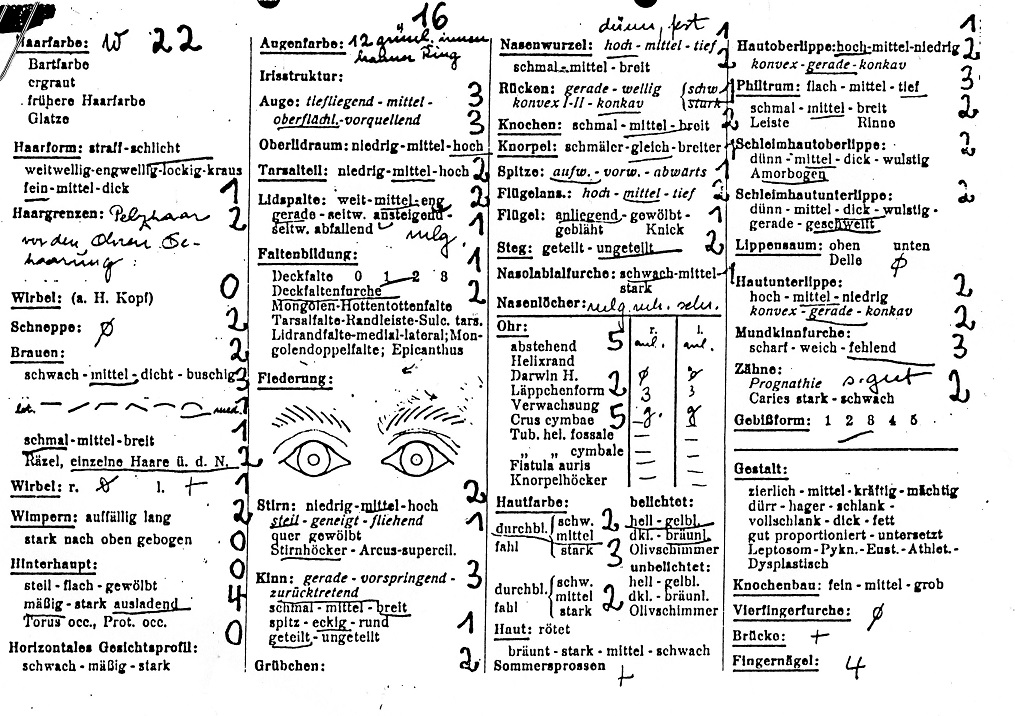
|
1938 Measuring of Gabriel Reinhardts forhead by Robert Ritter in 1938. (Archive Rita Winterstein-Prigmore)
|
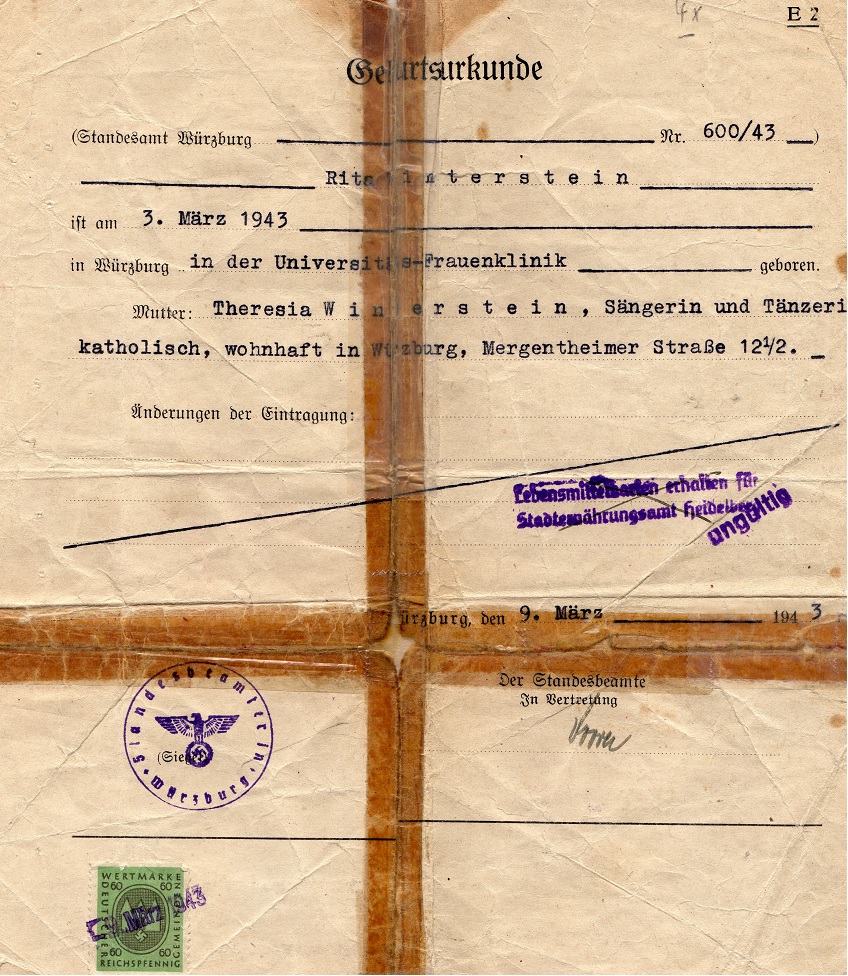
|
1943 Papo cuts in 1943 the birth certificate of Rita Winterstein in four pieces. They were hidden in the skirt of Josephine. (Archive Rita Winterstein-Prigmore)
|
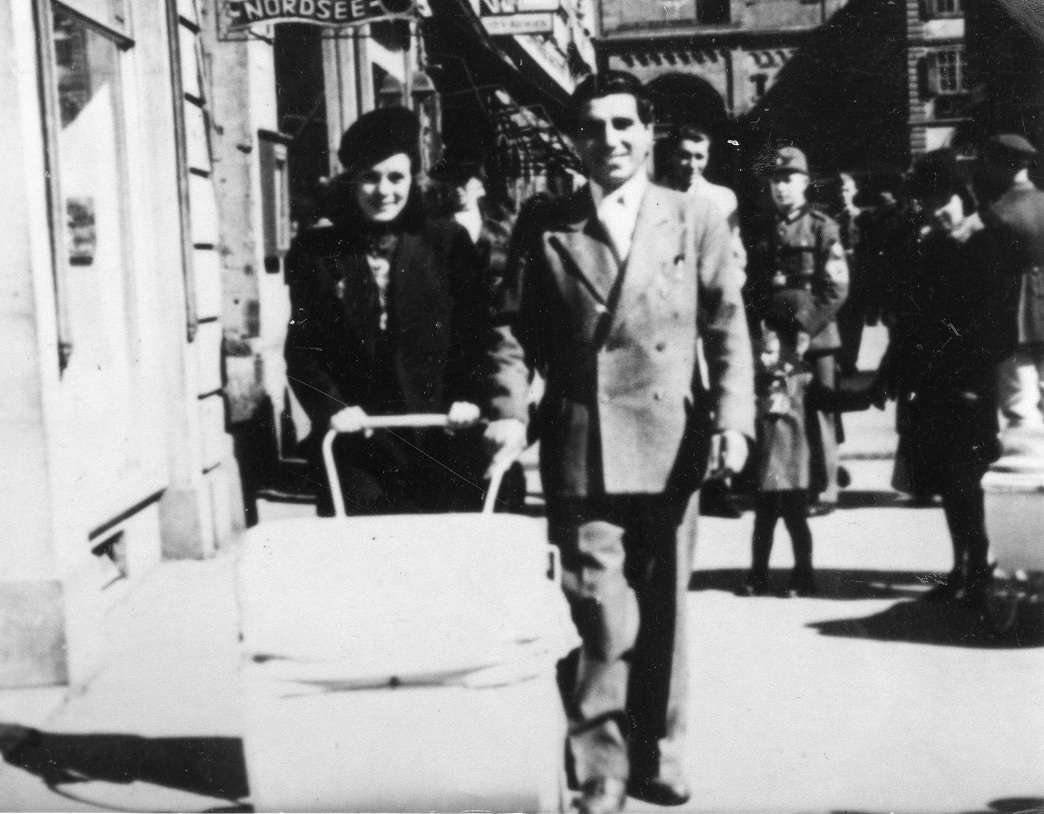
|
1943 Eind maart 1943 maken de nazi’s een propagandafoto van Theresia Winterstein en Gabriel Reinhardt met hun tweeling Rita en Rolanda. (Archief Rita Winterstein-Prigmore)
|
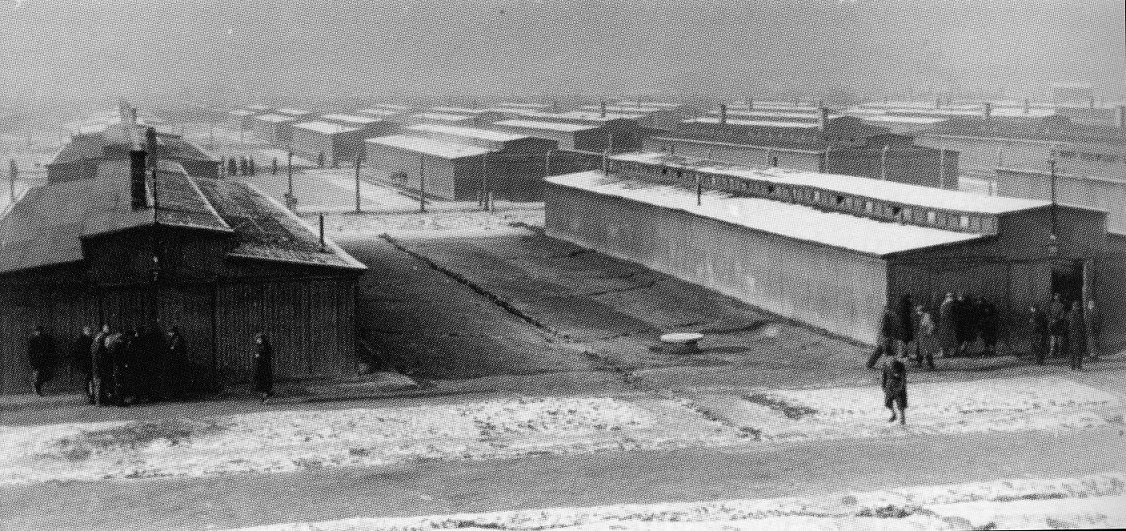
|
1944 Photo of the gypsy camp in Auschwitz in 1944. (Museum Yad Vashem, Jeruzalem)
|
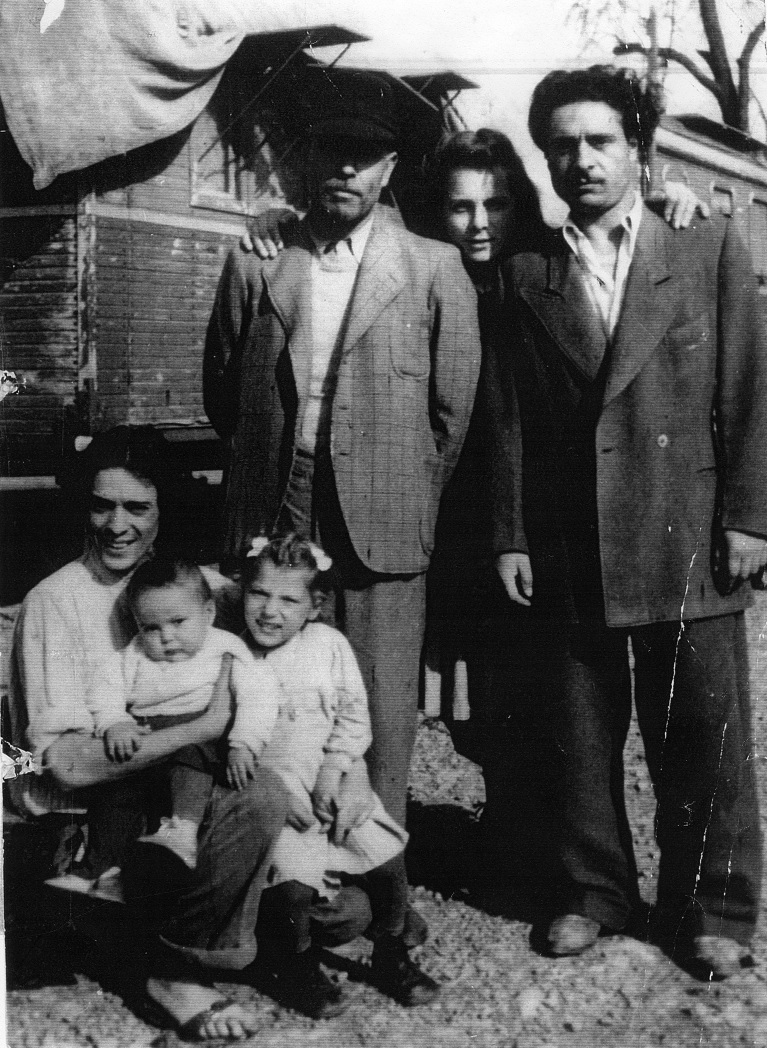
|
1945 The family Winterstein at the former salon wagon of Adolf Hitler in Heidingsfeld. From left to right: Otto, Peter, Rita en Johann Winterstein, the german huiskeeper Lizzy and Robert Winterstein, a nephew who also survived the concentration camps. (Archive Rita Winterstein-Prigmore)
|
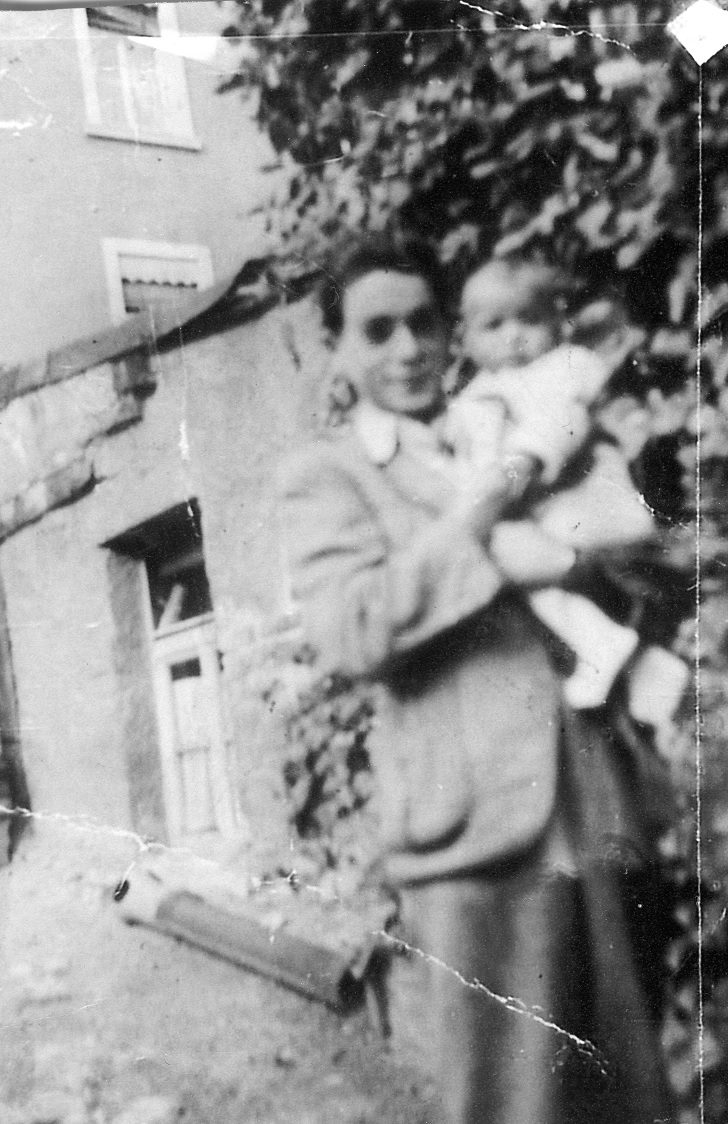
|
1945 Otto Winterstein poses shortly after his return from the concentration camp in 1945 with the two years old Rita Winterrstein. (Archive Rita Winterstein-Prigmore)
|
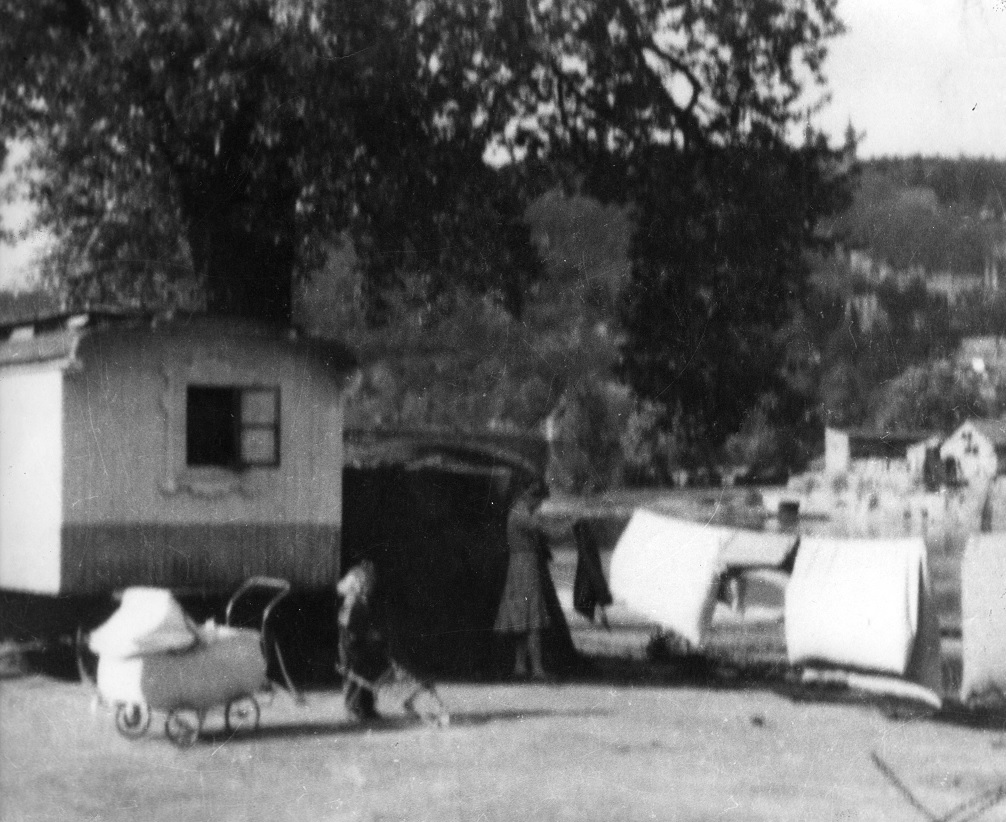
|
1946 In 1946 moves the family Winterstein to a barack of the city of Würzburg at the River Main nearby the city center. (Archive Rita Winterstein-Prigmore
|
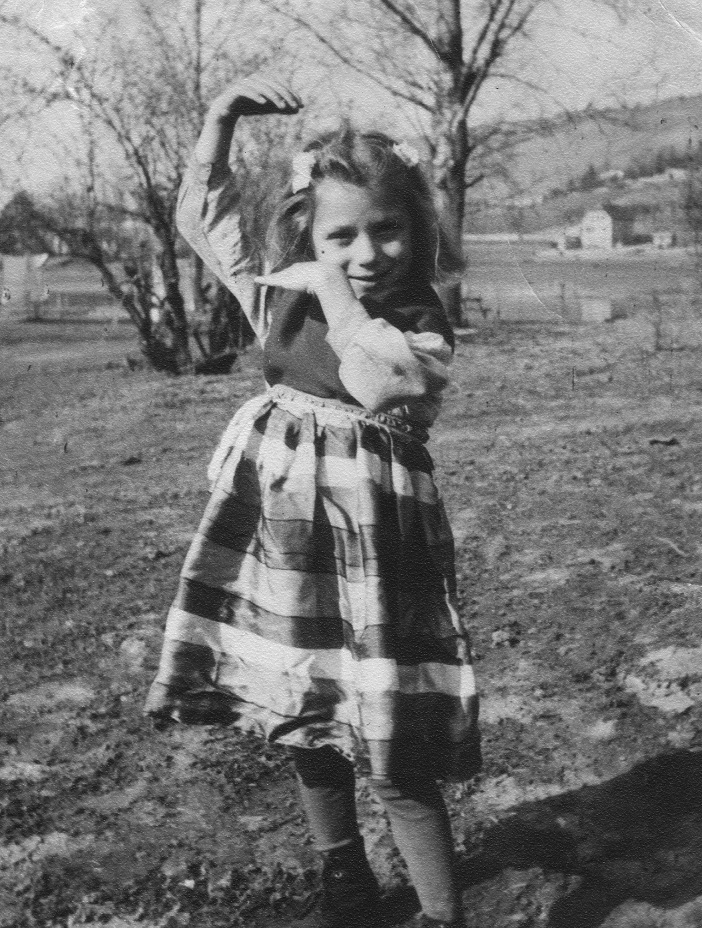
|
1948 The five years old Rita Winterstein in 1948. (Archive Rita Winterstein-Prigmore)
|
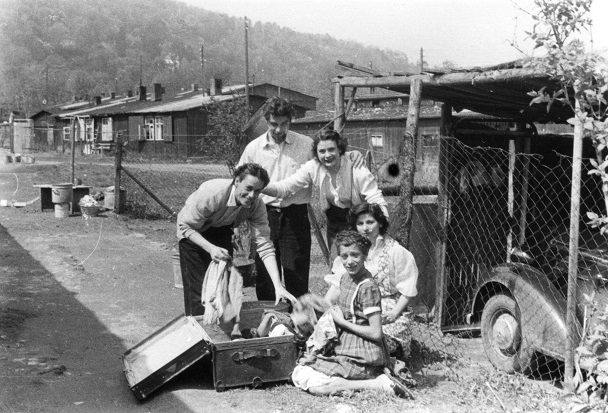
|
‘50 In the 1950 lives the family Winterstein in the baracks at de Frankfuterstrasse in Würzburg. From left to right: Otto, Lucki who helps in the household, Theresia, a related family member Sonja and Rita. (Archive Rita Winterstein-Prigmore)
|
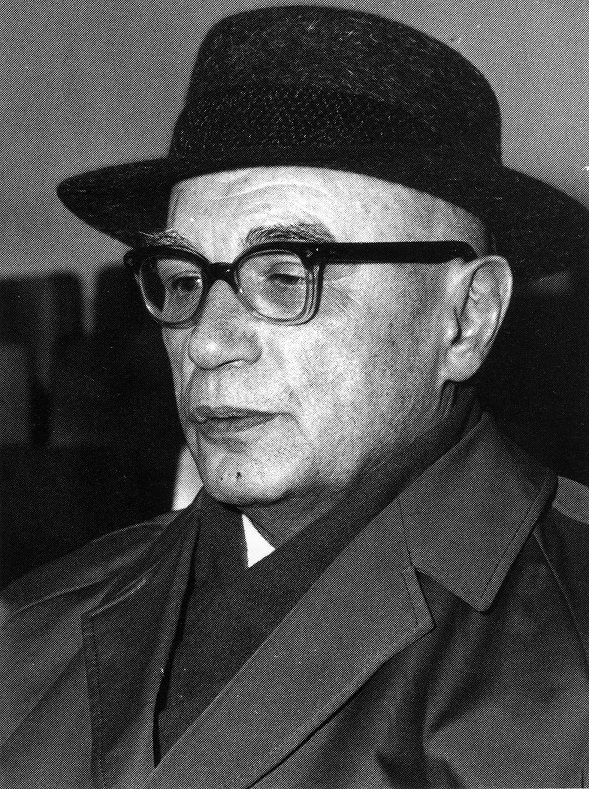
|
1959 Werner Heyde after his arrest in 1958. (Keystone Pressedienst Hamlburg)
|
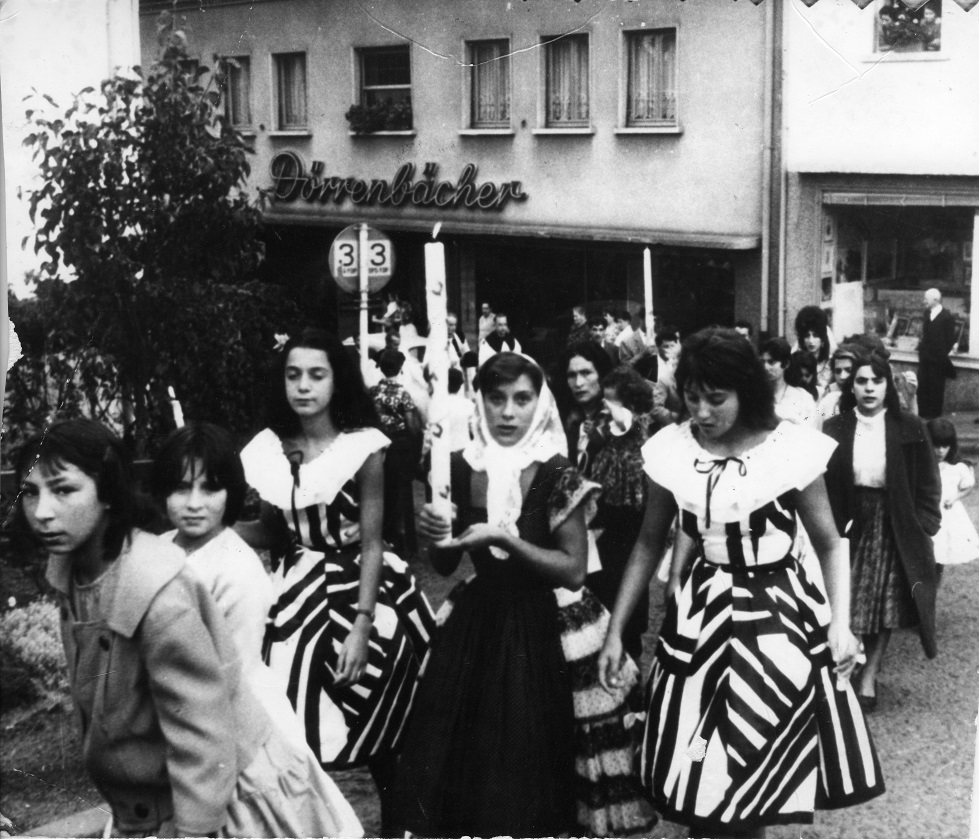
|
1961 Pegrimage to Illingen in 1961. Rita walks between twe nieces from Heilderberg. (Archive Rita Winterstein-Prigmore)
|
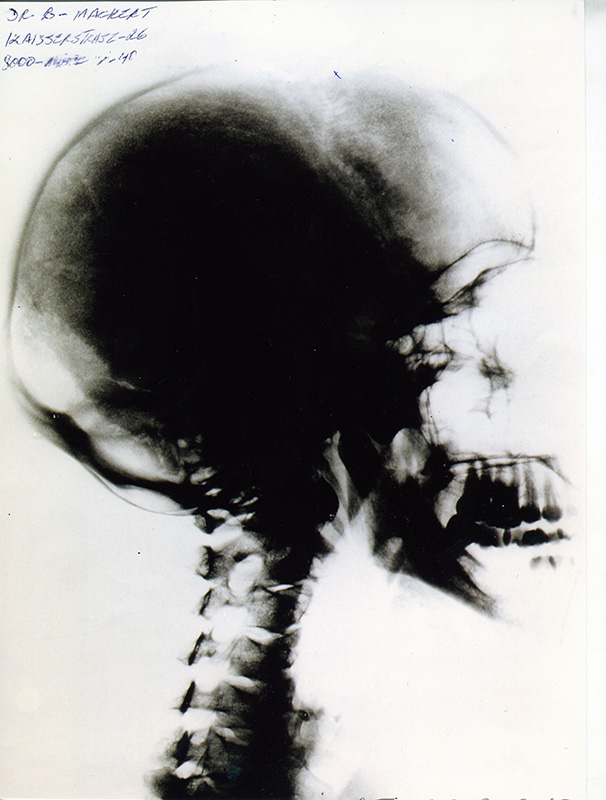 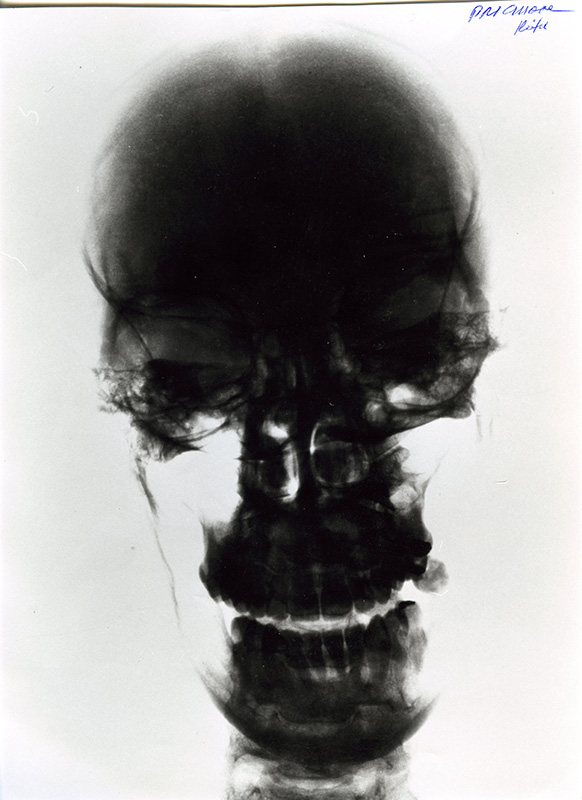
|
1973 °Röntgenphoto from the head of Rita Winterstein to the side with a notch cut above her left eye of 1,4 cm. (Archive Rita Winterstein-Prigmore)
|
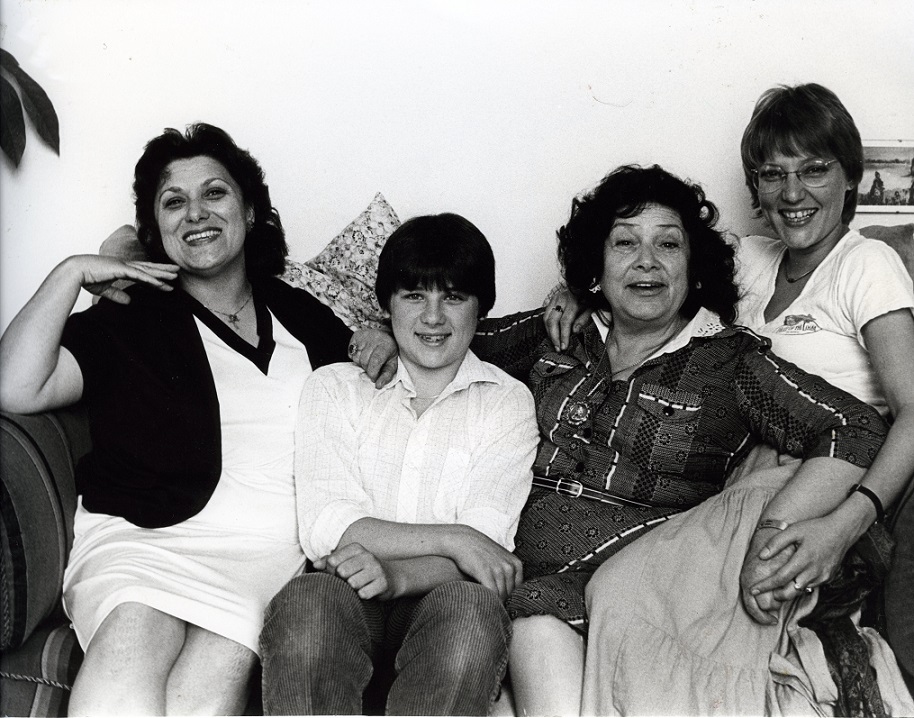
|
1981 In 1981 moves Rita Winterstein with her children to Germany. From left to right: Rita Winterstein, her son George III, Theresia Winterstein and lawyer Georgia Rackelmann from Amnesty International. (Archive Rita Winterstein-Prigmore)
|
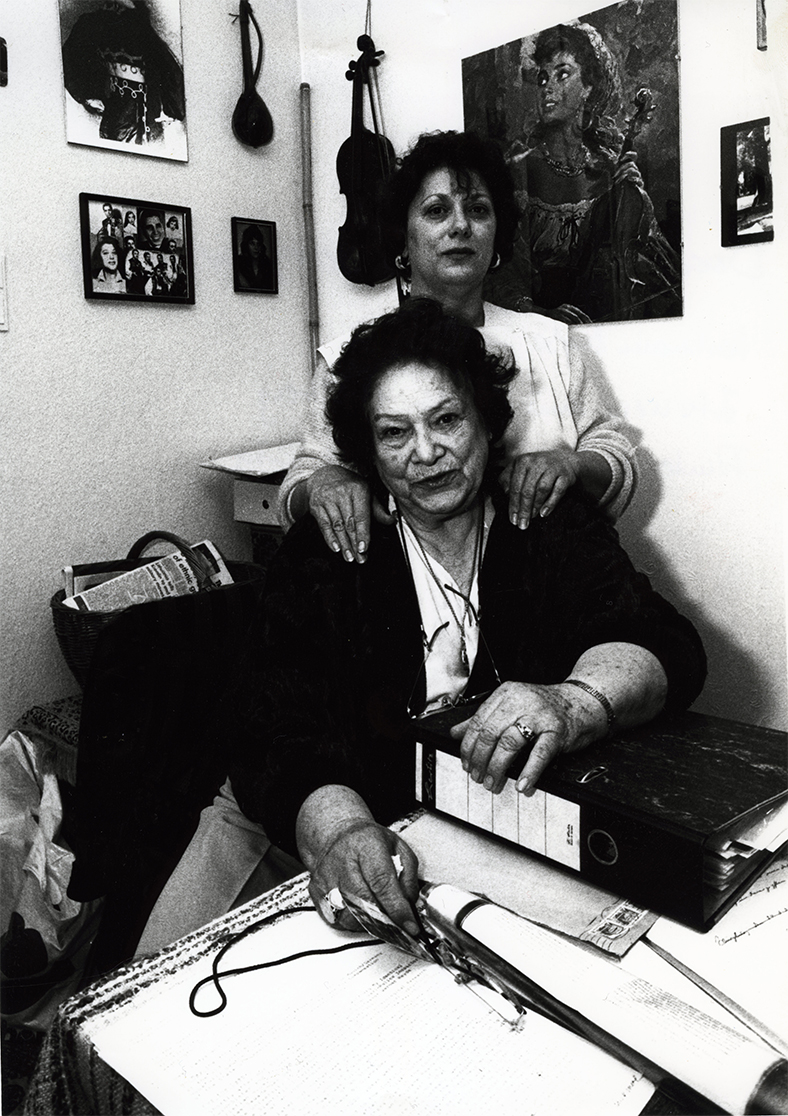
|
1985 Rita Winterstein in 2005 in the Holocaust Museum in Washington after the donation of a part of the family archive. (Archive Rita Winterstein-Prigmore)
|
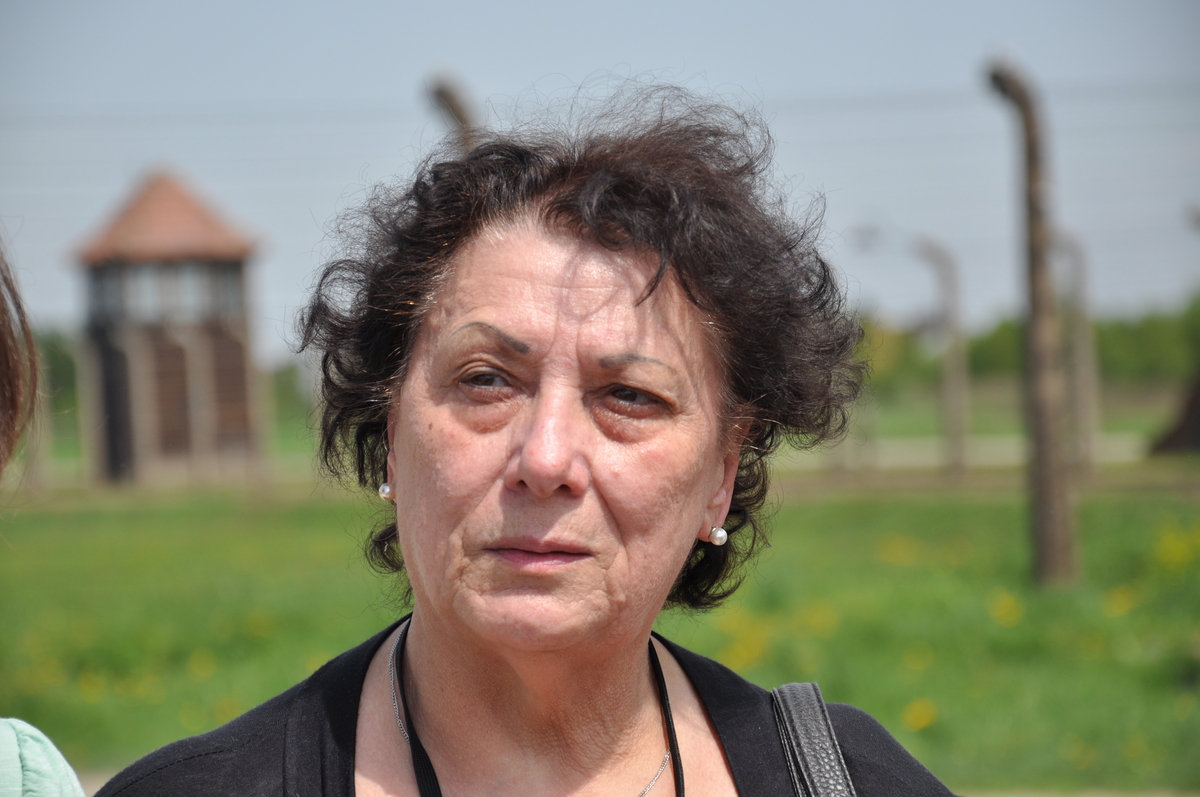
|
2013 Rita Winterstein visits in May 2013 the concentration camp of Auschwitz. (Photo Luc De Bolle)
|